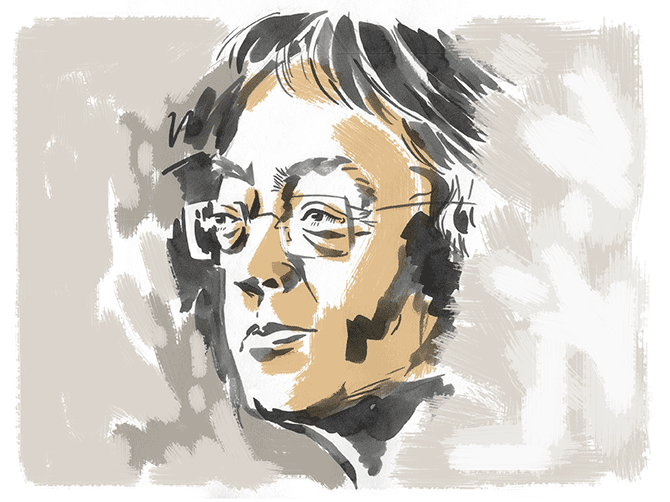'Did the Nobel committee, reviled for awarding Mr Dylan, play a little inside joke this time around, by awarding another lyricist who was once an aspiring musician?' asks Uttaran Das Gupta.
Illustration: Dominic Xavier/Rediff.com

The announcement of the Nobel Prize in Literature for Kazuo Ishiguro was greeted unanimously with acknowledgement of the English novelist's achievements, which includes the Booker winning The Remains of the Day (1987).
This was markedly different from last year when Bob Dylan winning the award had sparked outrage in many quarters, with Hari Kunzru even claiming: 'This feels like the lamest Nobel win since they gave it to Obama for not being Bush.'
When this year's winner was declared, The Guardian report did not fail to refer to it: 'The choice of a writer who has won awards including the Man Booker prize should pour oil on at least some of the troubled waters ruffled by Dylan's win.'
Such an attitude, however, seems to ignore the considerable success Mr Ishiguro has tasted as a jazz lyricist, and the self-acknowledged influence of his lyric writing on his fictional prose.
Mr Ishiguro has collaborated, most famously, with American jazz singer Stacy Kent and her saxophonist husband Jim Tomlinson; he contributed lyrics to their 2007 album Breakfast on the Morning Tram. (It was nominated for Best Jazz Vocal Album at the Grammy Awards in 2009.)
The title of the album is also inspired by Mr Ishiguro's fourth novel, The Unconsoled. Explaining it in an interview to The Guardian in 2015, he said: 'You have been up all night -- heartbroken -- but, in the early hours of dawn, you get on this tram and it is full of these commuters who are terribly cheerful and comfort you, and there is a buffet at the end of the tram and it has everything you want -- fantastic coffee -- and everyone chats to you and you stuff yourself with croissants.'
The BBC review of the album praised both Mr Ishiguro and Ms Kent for the narrative in the four songs on which they collaborate.
In his youth, Mr Ishiguro wanted to be a songwriter and singer -- becoming a writer, which he did by studying creative writing at the University of East Anglia, in his own words, was less glamourous.
Though he did not succeed in the music business in the beginning, song writing has been a major inspiration for his 'more respectable' fiction. In the same The Guardian interview, Mr Ishiguro talks about how song-writing influenced his fiction writing: 'One of the key things I learnt writing lyrics -- and this had an enormous influence on my fiction -- was that with an intimate, confiding, first-person song, the meaning must not be self-sufficient on the page. It has to be oblique, sometimes you have to read between the lines.'
There is, however, little mention of this skill in the Nobel citation. 'If you mix Jane Austen and Franz Kafka then you have Kazuo Ishiguro in a nutshell, but you have to add a little bit of Marcel Proust into the mix,' said Sara Danius, the permanent secretary of the Swedish Academy, which awards the prize.
Last year, soon after Mr Dylan won the prize, Anna North, in an opinion piece published in The New York Times, criticised the decision. 'Yes, Mr Dylan is a brilliant lyricist. Yes, he has written a book of prose poetry and an autobiography. Yes, it is possible to analyse his lyrics as poetry. But Mr Dylan's writing is inseparable from his music. He is great because he is a great musician, and when the Nobel committee gives the literature prize to a musician, it misses the opportunity to honour a writer.'
Yet, such an analysis is at best spurious and at worst full of all manners of the classist way of considering literature that excludes anything except the written word, published by a few select outlets, for an exclusive audience.
Perhaps, the one text that created this artificial dichotomy is The Love Song of J Alfred Prufrock, by T S Eliot, in which, thanks to his dislike of all things romantic, the modernist poet discards the entire tradition of lyrical poetry that could easily be put to popular music.
Now, more than 100 years later, who gets to decide which song is literature?
In fact, the very origins of Western literature -- and culture -- are closely related to music and song, and quite delightfully, rather obscene ones.
I am referring to the phallic songs of ancient Greece. In Chapter 3.3 of Poetics, Aristotle informs us that the earliest comedies had their origins in Dionysian processions, which would be full of obscene songs and would display a fetishised phallus.
Such processions were common in many towns around the Mediterranean even during Aristotle's times. In recent times, there have been attempts to revive such fertility traditions.
Such history is not unknown to any student of literature. So, did the Nobel committee, reviled for awarding Mr Dylan, play a little inside joke this time around, by awarding another lyricist who was once an aspiring musician?
That's anyone's guess, but facts are surely a delightful coincidence.











